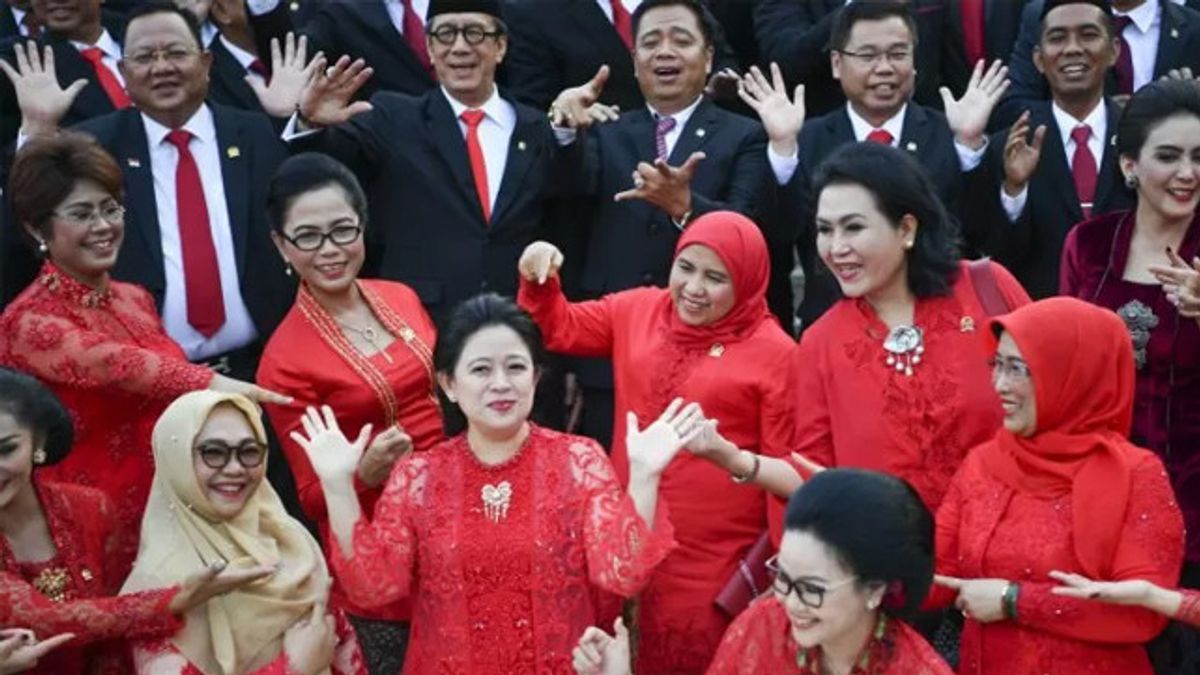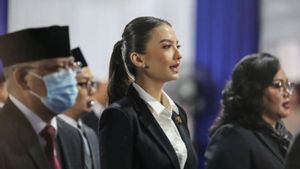JAKARTA - 'Everyone has the right to get special facilities and treatment to get the same opportunities and benefits in order to achieve equality and justice.' This is the content of the amendment to the 1945 Constitution, Article 28 H paragraph (2). Showing equality, men and women have the same rights. Free from systematic and structural discrimination in various aspects of life, including in the political aspect.
In its implementation, the regulation is able to erode the patriarchal culture in Indonesia. Today's women do not only dwell in the kitchen. Instead, they have been able to travel the world to use their rights as free human beings. A number of Indonesian women have shown their role in the political arena. It can be seen from the representation of women as members of the legislature which continues to increase from time to time, especially after the reform era.
Citing BPS data, in the 1999 election the number of women's representation in the DPR reached 9 percent, increased to 11.8 percent in the 2004 election, then to 17.86 percent in the 2009 election, 17.32 percent in the 2014 election, to 20.87 percent in the 2014 election. 2019 election.
Unfortunately, said Muhammadiyah University Lecturer Prof. DR Hamka (Uhamka), Said Romadlan, the percentage is still relatively low. Have not met the 30 percent quota according to the election rules that have been set, starting from the 2004 to 2019 election rules.

For example, Law Number 7 of 2017 concerning General Elections which is the basis for the implementation of the 2019 Election. This rule encourages every political party participating in the General Election to pay attention to the representation of women at least 30 percent when nominating candidates for members of the DPR, DPD, and DPRD.
"Well, the existing data is not up to 30 percent," said Said to VOI, Monday (1/8).
As a result, the percentage is only a quota. In the 2024 election, no longer in parliament, the KPU will determine 30 percent of women's representation in the management of political parties as a registration requirement to participate in the 2024 election.
The rules are contained in KPU Announcement Number 7/PL.01.1-Pu/05/2022 concerning the Registration of Political Parties as Candidates for Election Contesting in 2024, points A2-e.
"Include at least 30% (thirty percent) of women's representation in the management of political parties at the central level and pay attention to 30% (thirty percent) of women's representation in the management of political parties at the provincial and district/city levels."
According to Said, the lack of women's representation in parliament means that the resulting policies have not fully responded to the main problems faced by women. There are still many cases of women being handled from the perspective of men. In the end, the substance of the problem is not resolved.

That is why women's participation must be increased so that political decision making can be more accommodating and substantial. Also, strengthening democracy which always provides ideas related to pro-women and children legislation in the public sphere.
“Simple things like sharing toilets. Men and women have the same toilet, even though their needs are different. Then, breastfeeding rooms in public facilities are still inadequate, and so on. This is untouched from a male perspective,” he said.
"I think the rules made by the KPU are very good. The role of women in the legislature is quite vital. At least they can contribute to creating policies that support women,” Said continued.
Political Parties Must Give SpaceHowever, even though the door is wide open, women's interest in becoming politicians is still very minimal. Limited ability, especially education, can be one of the contributing factors.
“Women in big cities are arguably the majority of scholars. However, in a different area. Then, of the many scholars, how many are interested in becoming a politician or at least being involved in a political party," said Said.
In addition, Said added, the lack of representation of women in the legislature also comes from the political parties themselves which have not been able to provide equal opportunities for women.
Member of Commission IX DPR RI Irma Chaniago also admitted that. Not all political parties can provide a large space for women to become representatives of the people. So, it is better if the 30 percent representation in parliament becomes mandatory.
"It's not just a quota, nor is it 30 percent in party management, but 30 percent is mandatory in parliament. Only then can women have a bigger voice,” said Irma to VOI, Monday (1/8).

Because, if only 30 percent of women are represented as party administrators, it's the same thing. After all, in the end, political parties do not provide space for women to advance to the legislature. This should be a concern.
“There needs to be discretion, there needs to be regulations that can make women's roles marginalized, they can have room in the political arena. Political parties must give large space for women to be able to participate in the flaming legislature so that women are not only vote getters,” he said.
In addition to the lack of space given, not many women also have the capital to become people's representatives.
“In terms of social capital, there may be many women who have good electability, but there are still few women who have financial capital who are independent. On average, they still depend on their husband's funding," added Irma.
This condition should also be a concern of political parties. Helping women who are qualified, have the capability, capacity, and electability to advance to become people's representatives and should not be allowed to fight freely.
This is what political parties have not been able to do so that there are still many qualified women to be able to become representatives of the people, but cannot enter because of financial constraints.
To be able to fight to become a member of the legislature requires no small amount of capital.
"DPR RI for example. Minimum IDR 5 billion. You can only move, if you don't, you won't win. Now the wani piro is crazy. People today don't care whether they are qualified or not, the important thing is money. The proof can be seen, many corruptors can enter again in parliament. Many people who are legally disabled can be re-elected,” said Irma.
On the other hand, political parties cannot do anything because they have tripped over the parliamentary threshold.
"They don't want to know either. I don't know where the important thing is to be able to bring a seat, later in parliament they will only be vote getters, only followers, there is nothing to do, the important thing is that they bring seats," Irma added.
In fact, the representation of women in the legislature is very important.
“Especially now, the number of women continues to grow even more than the number of men. This means that the needs of women are certainly more numerous and varied. Ideally, it should be addressed from a women's perspective,” said Irma affirmed.
The English, Chinese, Japanese, Arabic, and French versions are automatically generated by the AI. So there may still be inaccuracies in translating, please always see Indonesian as our main language. (system supported by DigitalSiber.id)










